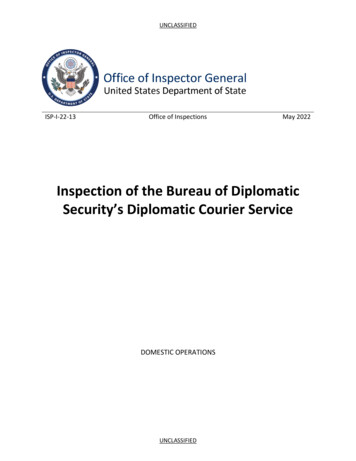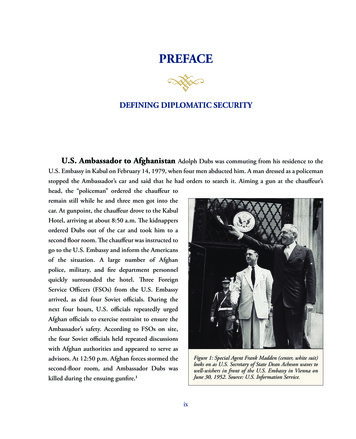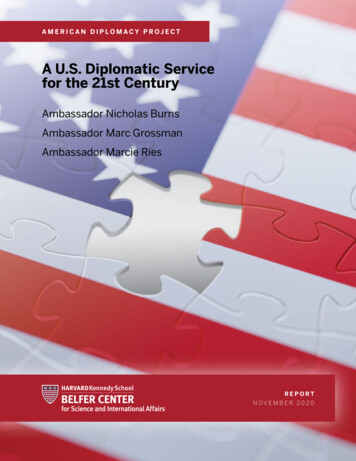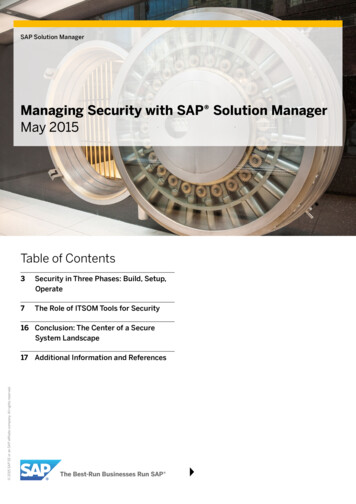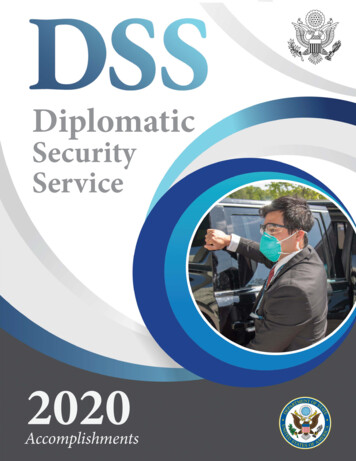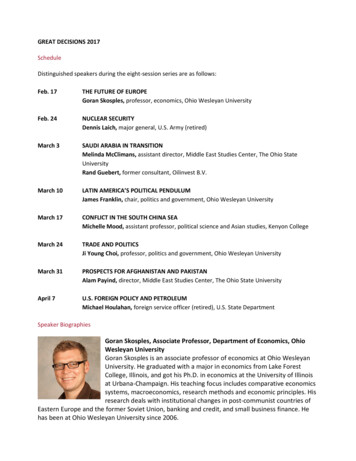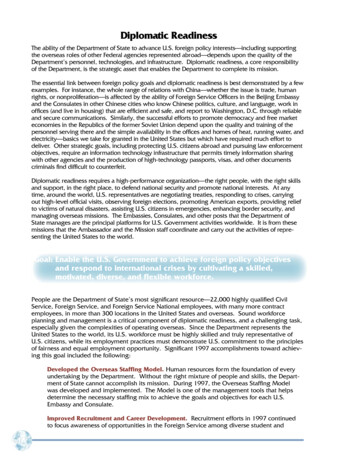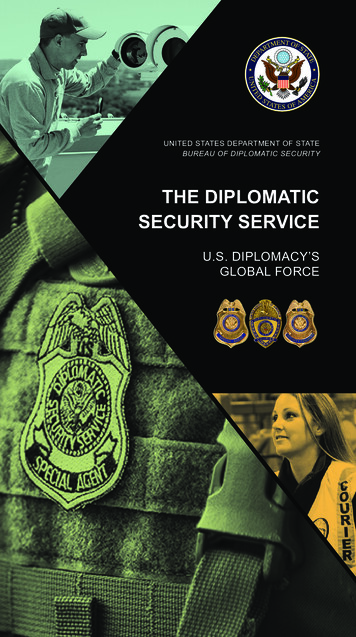
Transcription
UNITED STATES DEPARTMENT OF STATEBUREAU OF DIPLOMATIC SECURITYTHE DIPLOMATICSECURITY SERVICEU.S. DIPLOMACY’SGLOBAL FORCE
OUR MISSION: The Diplomatic Security Service (DSS) is thelaw enforcement and security arm of the U.S. Department ofState. DSS bears the core responsibility for providing a safeand secure environment for the conduct of U.S. diplomacy andfor conducting visa and passport fraud investigations aroundthe world. DSS is a leader in mitigating terrorist threats to U.S.personnel and facilities, mounting international investigations,and generating innovations in cybersecurity and physicalsecurity engineering.DSS personnel travelthe globe providingguidance, support, andleadership to protectAmerican diplomats andU.S. national interests.Right: With an American flag in the background,a DSS special agent escorts the U.S. Secretary of State.PROTECTING PEOPLE, PROPERTY,AND INFORMATIONThe men and women of the Diplomatic SecurityService belong to one of the most distinctive globalsecurity teams in the world. They protect thepeople, places, and vital information that allow theUnited States to be a leader in world events. The Diplomatic Security Service conducts dayto-day law enforcement and security operationswithin the Bureau of Diplomatic Security. The DSS family includes special agents,security engineering officers, security technicalspecialists, diplomatic couriers, security protectivespecialists, uniformed protective officers, civilservants, contractors, locally engaged securityprofessionals, U.S. Marine Security Guards,and a contingent of U.S. Navy Seabees. DSS is the most widely represented U.S. lawenforcement and security organization in the world,protecting people, property, and information at 275State Department locations around the globe.
DSSPROTECTSProtecting People and Facilities2U.S. diplomats and their families, as well asDepartment of State facilities, can be targets forterrorists and international criminals, even atlocations that might be considered low threat.U.S. embassies, consulates, and personneloverseas have been targeted by gunmen,terrorists, rockets, mortars, complex assaults,truck bombs, criminals, and violent mobs.A Worldwide PresenceThe Diplomatic Security Service protects U.S.interests by sustaining strong partnershipswith international law enforcement andsecurity organizations. These relationshipsallow DSS to assist and coordinate with U.S.federal, state, and local law enforcement agencies.This includes locating fugitives from justice,identifying criminal evidence in support ofU.S. prosecutors, and providing support to lawenforcement in both the United States and abroad.3DSS provides continuous security for theU.S. Secretary of State, the U.S. Ambassadorto the United Nations, and visiting cabinetlevel foreign dignitaries when in the UnitedStates. This includes foreign ministers andmany former heads of state, as well as highlevel delegates attending the annual UnitedNations General Assembly in New York City.DSS protects emissaries from internationalorganizations and visiting royalty. Notableprotectees have included His Holiness the DalaiLama of Tibet, members of Great Britain’sroyal family, the Chairperson of the AfricanUnion, the NATO Secretary General, anddignitaries visiting presidential inaugurations.Right: DSS special agents scan the room as theSecretary of State delivers remarks at a ministerialmeeting in Washington, D.C.The Diplomatic Security ServiceU.S. Diplomacy’s Global Force
Top: Diplomatic couriers prepare classified andsensitive air cargo for shipment from Washington,D.C., to U.S. diplomatic facilities overseas.4Right: A mobile video systems specialist (left) andtwo security engineering officers discuss temporaryplacement of a video surveillance camera near theUnited Nations headquarters in New York during theU.N. General Assembly.DSS coordinates U.S. government agenciessupporting international special securityevents (ISSEs) abroad. DSS leads theInternational Security Event Group, whichcoordinates security, law enforcement, andintelligence support for ISSEs overseas,including major athletic events and summits.The Diplomatic Courier Service ensuresthe worldwide security and protection ofclassified diplomatic pouches. An expert cadreof approximately 100 diplomatic courierstransports classified and sensitive materialsaround the world. With regional courieroffices in the United States, Germany, SouthAfrica, Thailand, South Korea, Bahrain, Brazil,Cote d’Ivoire, and Senegal, couriers travelto diplomatic posts throughout the world,constantly trouble-shooting and innovating.Technical ExpertiseDSS technical experts develop and put inplace a wide range of technical securitycountermeasures to protect U.S. diplomats andsensitive information. Security engineeringofficers provide technical security support andengineering expertise to protect U.S. ForeignService posts overseas and in domestic locations.Responsibilities include working with all aspectsof security systems – from design, developmentand analysis to installation and testing. Theyconduct security assessments for U.S. overseasmissions, conduct technical surveillancecountermeasure inspections, implement computersecurity measures, and support dignitary travel.5Security technical specialists provide supportand assist in worldwide technical securityprograms that provide protection for U.S.Department of State facilities and personnelfrom technical espionage, acts of terrorism, andcrime. Their work is incredibly varied – managingprojects and people, supporting dignitarytravel, exploring the use of new technology, andinstalling, maintaining, and repairing a vastarray of complex technical security equipment.The Diplomatic Security ServiceU.S. Diplomacy’s Global Force
Mobile Security Deployments (MSD) teamsprovide rapid tactical responses in emergencysituations by deploying highly trained securitypersonnel. These teams can deploy anywherein the world within 24 hours to provide securitysupport to posts under high-threat conditionsand to enhance protective support for theSecretary of State and other diplomats.U.S. Marines – on duty protecting U.S. embassies.Marine Security Guard (MSG) detachments arestationed at more than 175 U.S. embassies andconsulates around the world, protecting U.S.diplomats and responding immediately to criseslarge and small. The Marines protect U.S. missionpersonnel, property, and classified information.A DSS special agent with a Mobile SecurityDeployments team stands watch on the perimeter as avisiting Saudi Arabian diplomat prepares to travel to ameeting with the U.S. Secretary of State in New York.The DS Command Center near Washington,D.C., monitors Department of State facilities anddelegations around the world around the clock,using state-of-the-art technology and relayingtwo-way communication as events unfold. Withlinks to other watch centers, including U.S.military combatant commands, the DS CommandCenter rapidly shares critical information.DSS works in close partnership with U.S.military regional commands. DSS closelycoordinates with Department of Defensegeographic combatant commands, which havethe ability to temporarily deploy combat-trainedtroops to augment security at diplomatic posts.7U.S. Marine Corps photo6More than 35,000 local guards protect U.S.overseas compounds. The local guards patrol thegrounds, inspect vehicles, visitors, and packages,and respond to alarms and requests for assistance.Local guards are usually citizens of the host nationand managed by Regional Security Officers.A viceU.S.Diplomacy’sGlobalForceU.S. Embassy Bamako.
DSS prepares the foreign affairs communityand families to safely live and work overseasthrough its five-day Foreign Affairs CounterThreat (FACT) course. The FACT course providesthe practical skills necessary to recognize, avoid,and respond to terrorist threats. Participantslearn planning and risk management, securityawareness, personal resilience, emergencymedical care, personnel recovery, improvisedexplosive device (IED) awareness, self-defense,response to fire as a weapon, ballistics and attackrecognition, response to direct and indirectweapons fire, and counterterrorist driving.8On the final day of training, participants areinvolved in a three-hour reality-based culminationexercise that uses professional role playersserving as host nation officials, bystanders,and attackers. The exercise ensures employeesand family members can appropriately applyeach of the skills they learned during the weekwhile carrying out diplomatic functions in ahigh-threat and high-stress environment.In a training exercise, Diplomatic Security UniformedProtective Officers respond during a Full-Scale ActiveShooter Exercise outside a U.S. Department of Statefacility.9Domestic Protective ServicesMore than 1,000 uniformed security officersprotect Department of State facilities across theUnited States. They patrol facilities, screen visitorsand packages, and monitor communications andsecurity systems. When emergencies occur, theyare often the first responders on the scene, takingcontrol of the situation and, if necessary, providingfirst aid and preparing for follow-on assistance.DSS uses specially trained canine securityteams and their handlers to screen deliveries toDepartment of State facilities and during specialand major events, such as the United NationsGeneral Assembly and the Arctic Summit.A DSS explosive detection canine team conductsa vehicle check during a training exercise.The Diplomatic Security ServiceU.S. Diplomacy’s Global Force
REGIONAL SECURITY OFFICERSTHE FACE OF SECURITYAT U.S. DIPLOMATICPOSTS OVERSEAS Protect U.S. diplomatic facilities, personnel,and information. Serve as the U.S. embassy’s law enforcementliaison to the host nation. Arrange training for foreign law enforcementand security officers to combat terrorism.the world as Regional Security Officers (RSOs) in Work with host nation police to pursue investigativeleads on fugitives who may have fled overseasafter committing crimes in the United States.U.S. diplomatic posts. RSOs manage security programs Advise U.S. citizens about safety and security abroad.Approximately 1,000 special agents are assigned aroundand provide the first line of defense for U.S. personneland their families, as well as diplomatic facilities andnational security information. RSOs develop, implement,and manage a range of physical, cybersecurity, andpersonnel security programs to mitigate threats and10The RSO and assigned staff:provide safe living and working environments. RSOs Share security information with the U.S. private sectorthrough the Overseas Security Advisory Council. Oversee the conduct of personnel security backgroundinvestigations for the U.S. Department of State andother U.S. government agencies at posts overseas.11also serve as the principal law enforcement and securityadvisors to U.S. Ambassadors and Chiefs of Mission.The Diplomatic Security ServiceU.S. Diplomacy’s Global Force
A cyber threat branchchief discusses howanalysts track threats tothe Department of State’scritical IT infrastructure.DSSINVESTIGATESInvestigating Misconductand Violent Crimes12DSS investigates allegations of criminal andadministrative misconduct involving Departmentof State employees, dependents, contractors,and other U.S. personnel serving in diplomaticcommunities. DSS also investigates administrativeand criminal cases in the United States with aconnection to Department of State operations.Investigative specialists comparefindings as they piece together acohesive picture of a crime.Confronting CybercrimesDSS investigators confront the dramaticincrease in crimes involving computersand other electronic technologies affectingthe Department of State. DSS personnelexecute search warrants worldwide onelectronic devices and storage media.Providing Cyber andTechnology Security13As the premier law enforcement and securityauthority within the foreign affairs community,DSS executes its critical cybersecurity missionto ensure a safe digital environment for globaldiplomacy and the advancement of Americannational security interests. This involvesprotecting people, information, and technologyassets worldwide against cyberattacks, databreaches, and information leaks. To effectivelyrisk manage the Department’s global cyberexposure, the Cyber and Technology Security(CTS) directorate leverages its cyber, technology,and related criminal investigative programsto detect, analyze, and respond to all forms ofcyber-based threats in a holistic manner.The Diplomatic Security ServiceU.S. Diplomacy’s Global Force
INVESTIGATINGVISA AND PASSPORT FRAUDDSS special agents:U.S. passports and visas are among the mostvaluable documents in the world. Terrorists andtrans-national criminals make wide use of bogusidentities and counterfeit or stolen documents asgateways to more serious crimes, while fugitives14often seek to flee overseas and evade justice.DSS investigates criminal organizations thatprofit by exploiting temporary foreign workers.When investigators uncover visa-crime kingpinsin the United States, DSS also knocks out thesource of numerous criminal visa applicationsat U.S. embassies and consulates.DSS special agents conduct criminal investigationsfrom major field offices in Boston, Chicago, Houston,Los Angeles, Miami, New York City, San Francisco,and Washington, D.C., as well as from resident officesthroughout the United States, including Puerto Rico.These offices work closely with local, state, tribal, andfederal authorities on a wide range of investigations. Have a century of experienceinvestigating passport and visa fraud. Are federal law officers with authority toconduct investigations and make arrests. Investigate the fraudulent issuance,acquisition, and use of U.S. passports.15 Build close relationships with passportoffices as well as local, state, andfederal law enforcement agenciesthroughout the United States. Are members of the federal Documentand Benefit Fraud Task Forces (DBFTFs)in approximately 20 U.S. cities. Deploy to U.S. embassiesworldwide to investigate suspectedvisa and passport fraud. Train thousands of foreign lawenforcement, immigration, and otherpersonnel to recognize fraudulentdocuments, leading to the revocationor denial of more than 50,000 visasand the arrest of well over 10,000individuals by host nation partners forvisa and passport-related charges.The Diplomatic Security ServiceU.S. Diplomacy’s Global Force
DSSCOMBATSTERRORISM16DSS special agents deploy to major internationalevents, such as the annual United Nations GeneralAssembly in New York City and the summer andwinter Olympic Games. Special agents investigatesuspicious activities and potential threats againsthigh-profile protectees and coordinate the flowof intelligence and law enforcement informationthroughout an inter-agency network.DSS participates in FBImanaged Joint TerrorismTask Forces (JTTFs) inmore than two dozen U.S.cities. DSS special agentsassigned to these task forceswork with state, local, andother federal law enforcementorganizations to investigateindividuals and organizationssuspected of planning orcommitting terrorist acts athome and abroad. DSS taskforce officers are repeatedlydeployed alongsidetheir FBI colleagues tofurther counterterrorisminvestigations throughoutthe world.DSS special agents from the Office of Mobile SecurityDeployments review satellite imagery while assignedto a high-threat protective detail during the annualUnited Nations General Assembly in New York.Workforce and InformationAssurance17DSS works across the Department of State toproperly vet and clear employees and contractorswith access to the Department’s information andfacilities. As one of 24 U.S. government agencieswith authorized investigative and adjudicativeauthority, as well as the third largest industrialsecurity population, DSS is responsible forgranting and maintaining an individual’s accessto classified material. Once entrusted, DSSworks with all employees to ensure that reportingrequirements are followed and security incidentsare properly handled. With a focus on deterrenceof issues, DSS strives to prevent any risk toDepartment employees, information, and facilities.The Diplomatic Security ServiceU.S. Diplomacy’s Global Force
Antiterrorism AssistanceProgram – Training GlobalSecurity PartnersThe Antiterrorism Assistance (ATA) programaims to build counterterrorism capacityamong international law enforcement andsecurity partners. ATA provides advancedcounterterrorism training and equipmentgrants to maintain and increase partners’abilities to find and arrest terrorists. Nearlyall terrorists captured overseas have beenapprehended by law enforcement authoritiesof partner nations, most of which arerecipients of ATA training and equipment.18Top Left: Tunisian police conduct hostage-rescuetraining in 2018 at the new Jordanian GendarmerieTraining Academy outside of Amman, Jordan. Thefacility, funded through the Antiterrorism Assistance(ATA) program, trains at least 22 nations.Top Right: An ATA-trained crisis response teamapproaches a simulated mass-casualty incident duringan annual East Africa Joint Operations exercise inNairobi. Security officials from Kenya, Tanzania, andUganda took part.Bottom: An ATA-trained police bomb technicianrenders safe a simulated car bomb during an EastAfrican Joint Operations exercise in Nairobi, Kenya.19DSS special agents assigned as Assistant RegionalSecurity Officer-Investigators (ARSO-I) arekey components to protecting the United Statesby disrupting criminal and terrorist mobilitythrough proactive overseas investigation, capacitybuilding, and liaison with foreign partners. DSSdeploys ARSO-Is to more than 100 embassiesor consulates. Since 2005, the ARSO-I programhas coordinated thousands of overseas arrestsand fugitive returns. The program also hastrained more than 150,000 foreign personnel toidentify signs of fraudulent travel documents.The Diplomatic Security ServiceU.S. Diplomacy’s Global Force
The Overseas Security Advisory Council (OSAC) promotessecurity cooperation between U.S. private sector interestsworldwide and the U.S. Department of State.20DSSPARTNERSPartnering with the Private SectorTHE OVERSEAS SECURITY ADVISORY COUNCILThe Overseas Security Advisory Council(OSAC) promotes security cooperationbetween U.S. private sector interestsworldwide and the Department ofState. OSAC identifies threats to U.S.companies, non-governmental organizations, faithbased organizations, and members of academiccommunities operating around the globe. One ofOSAC’s main areas of focus is the quick sharingof unclassified security and safety informationbetween the U.S. government and the U.S. privatesector working overseas. See www.osac.govThe www.rewardsforjustice.net website providesinformation on Department of State rewards forinformation that leads to the arrest or convictionof anyone who plans, commits, aids, or attemptsinternational terrorist acts against U.S. persons orproperty.21REWARDS FOR JUSTICEEstablished by Congress, the Rewards for JusticeProgram allows the Secretary of State to offerfinancial rewards in excess of 25 million forinformation that leads to the arrest or convictionof anyone who plans, commits, aids, or attemptsinternational terrorist acts against U.S. persons orproperty; that prevents such acts from occurringin the first place; that leads to the identification orlocation of a key terrorist leader; or that disruptsterrorism financing.See www.rewardsforjustice.netThe Diplomatic Security ServiceU.S. Diplomacy’s Global Force
TheDiplomaticSecurityServiceis Present inOVER 170COUNTRIESWorldwideDSS Field and Resident OfficesNotesAtlanta, GAGreensboro, NCPortsmouth, NHBoston, MAHonolulu, HISan Diego, CABridgeport, CTHot Springs, ARSan Francisco, CABuffalo, NYHouston, TXSan Juan, PRCharleston, SCLos Angeles, CASeattle, WAChicago, ILMiami, FLSt. Albans, VTDallas, TXMinneapolis, MNSt. Louis, MODenver, CONew Orleans, LATucson, AZDetroit, MINew York, NYWashington, DCEl Paso, TXPhiladelphia, PATo contact DSS investigative offices in U.S. cities, seehttps://www.state.gov/m/ds/about/18892.htmFor DSS offices overseas,contact individual U.S. embassies, consulates, or missions.Photo Credit: Shutterstock
All photos are property of theU.S. Department of State unless otherwise noted
United States Department of StateBureau of Diplomatic SecurityWashington, D.C. 20522-2008Issued August 2018www.diplomaticsecurity.state.gov@StateDeptDSS
specialists, diplomatic couriers, security protective specialists, uniformed protective officers, civil servants, contractors, locally engaged security professionals, U.S. Marine Security Guards, and a contingent of U.S. Navy Seabees. DSS is the most widely represented U.S. law enforcement and security organization in the world,


